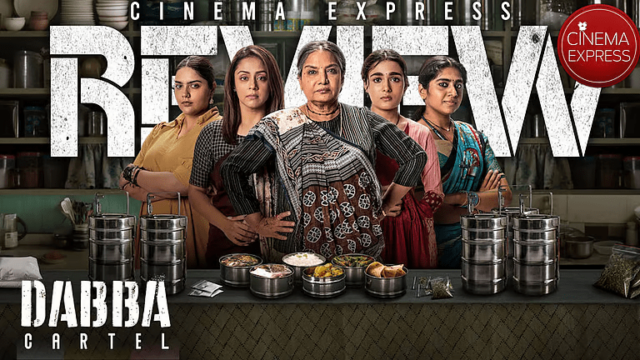Also starring Sai Tamhankar and Gajraj Rao, the crime-comedy series has an intriguing premise but is overstuffed with cliches
Dabba Cartel(2 / 5)
What if a bunch of ‘ordinary’ women in Mumbai’s sister city Thane turn their simple tiffin service into a drug-peddling operation? This is an intriguing setup that promises an exploration of multiple elements, including middle-class women taking over a largely masculine space, sharing vulnerabilities and breaking ‘really’ bad. On top of that, these ordinary women are played by some of the most extraordinary actors from the country. There’s Shabana Azmi as Sheilaben with her stern Gujarati accent and mysterious face; Jyotika as Varuna, an upper-class, shrewd, struggling entrepreneur; Nimisha Sajayan as Mala, the chirpy, energetic and ambitious house-help; and Shalini Pandey as Raji, an innocent housewife running the tiffin service. Having such a powerhouse of talents from across all the major film industries, what could possibly go wrong? Sadly, a lot.
Barring its catchy one-liner, Dabba Cartel unfolds with genericity. A big pharmaceutical company, VivaLife, comes under the scanner for manufacturing an illicit drug containing an addictive opioid. An honest middle-aged official, Ajit Pathak (the inimitable Gajraj Rao) working for the drug authority FDSCO, comes to investigate. He is joined by a rookie female cop, Preeti (Sai Tamhankar) looking for a big case to boost her career. The problem is not just that these are instances which we have seen multiple times before; rather, there is no effort taken to rise over these cliches and make them part of the show’s tone. Everything remains a tad too simplistic.
There is also little to root for in the multiple narratives. We don’t stay with a single character for long. Raji’s husband, Hari, wants to go to Germany and tries to impress his boss, Shankar (Jisshu Sengupta). Varuna is struggling to pay the rent for her clothing store. Mala is blackmailed by her boyfriend with her private videos. Preeti develops feelings for the bubbly broker, Shahida (Anjali Anand). Sheilaben has a dark past which spills over into her present. There is a lot going on with no time to stay on a single thread. It feels like a material for two seasons that is stuffed into one. The makers seem to be in a hurry to tell the story. Even the female gang’s entry into the drug business happens without much spice. One by one they happen to come together, and in no time they are already cooking the most addictive products. Where is the thrill? Where is the edge? It is filmed rather lazily in a matter-of-fact way. There is no flavour in the visuals, no bite in the editing. The novelty of the initial idea begins to fade away.
Cast: Shabana Azmi, Jyotika, Nimisha Sajayan, Shalini Pandey, Gajraj Rao, Jisshu Sengupta, Sai Tamhankar and Anjali Anand
Director: Hitesh Bhatia
Creators: Shibani Akhtar, Vishnu Menon, Gaurav Kapur and Akanksha Seda
Streamer: Netflix
There are some portions in the series which are delightfully elevated by the actors, like a scene where Mala and Shahida decide to taste a fresh batch of a new drug. In no time, their eyes turn red and heavy. The world around them begins to seem hazy. “Kuch ho hi nahi raha. Nalla maal hai (Nothing’s happening, this is bad stuff),” Mala says hysterically. Shahida joins in the laughter. It is a mad trip. The show needed a similar energy to sustain. Right now, its dullness is heavily lifted by the performances. Shabana maintains a no-nonsense demeanour throughout, even though the writers fail to give the right release to her character. She is grossly underwritten, with no high moments to really subvert her image. Jyotika is compelling too, especially in some of the emotional portions. The real beast, however, is Nimisha, exerting a crazy energy with her distinct Mumbaiyya accent. When a scene is going nowhere, she brings a manic charm to it. It is a shame that the makers don’t realise the real potential of the character; she ends up being just a laughing stock in the later episodes.
The show finally ends with a promise of the next season with the hurried introduction of a new enigmatic character in the climax. But do we really want to go back to this world? It is miles away from becoming India’s Narcos or Breaking Bad—shows which rose from the bare basics to become a reflective rumination on the human condition with a detailed exploration of morality and violence. Dabba Cartel has no such ambitions. It is happy being substandard, satisfied with being generic. It has no local touch. You open this Dabba with a heart full of hope. The fragrance is appealing, it looks delicious. As you take a bite, though, blandness begins to kick in. It is, after all, the same old.
News Credits: cinema Express










